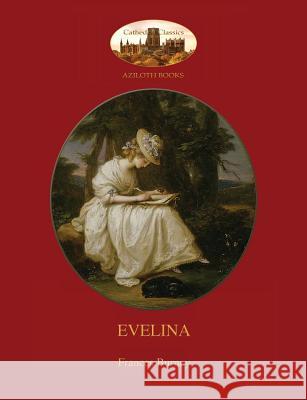Evelina: With Introduction by Austin Dobson, and Hugh Thomson's 81 Classic Illustrations (Aziloth Books) » książka
Evelina: With Introduction by Austin Dobson, and Hugh Thomson's 81 Classic Illustrations (Aziloth Books)
ISBN-13: 9781909735927 / Angielski / Miękka / 2016 / 310 str.
Evelina: With Introduction by Austin Dobson, and Hugh Thomson's 81 Classic Illustrations (Aziloth Books)
ISBN-13: 9781909735927 / Angielski / Miękka / 2016 / 310 str.
(netto: 78,06 VAT: 5%)
Najniższa cena z 30 dni: 74,70
ok. 16-18 dni roboczych.
Darmowa dostawa!
Frances Burney was born at King's Lynn, Norfolk, on 17th June 1752, the third of Charles and Elspeth Burney's six children. A precocious child, at 10 years old Frances was already showing a talent for 'scribbling' (as she called her writing). Her father encouraged her work as a hobby, but set his face against any publication of her work, calling it "unladylike." Burney acquiesced, and destroyed her first novel, but with maturity her confidence grew and (albeit it anonymously) she eventually published her novel 'Evelina' in 1778, to widespread critical acclaim, with such literary luminaries as Dr. Johnson, David Garrick and Edmund Burke praising her wit and biting satire. Such was the demand for 'Evelina', it very quickly went through four editions, and has remained popular ever since. A multi-layered novel of manners, Burney uses the eponymous heroine's honesty, innocence, and bucolic world-view as a mirror in which to reveal the shallow, jejune world of London's upper classes, through which Evelina navigates an uneven passage to maturity and romance. The work is by turns an elegant plea against female repression, a satirical expose of London's 18th century elite, a valuable sociological record of etiquette and social mores, and a heart-warming tale of true love.
Frances Burney was born at King's Lynn, Norfolk, on 17th June 1752, the third of Charles and Elspeth Burney's six children. A precocious child, at 10 years old Frances was already showing a talent for 'scribbling' (as she called her writing). Her father encouraged her work as a hobby, but set his face against any publication of her work, calling it "unladylike". Burney acquiesced, and destroyed her first novel, but with maturity her confidence grew and (albeit it anonymously) she eventually published her novel 'Evelina' in 1778, to widespread critical acclaim, with such literary luminaries as Dr. Johnson, David Garrick and Edmund Burke praising her wit and biting satire. Such was the demand for 'Evelina', it very quickly went through four editions, and has remained popular ever since. A multi-layered novel of manners, Burney uses the eponymous heroine's honesty, innocence, and bucolic world-view as a mirror in which to reveal the shallow, jejune world of London's upper classes, through which Evelina navigates an uneven passage to maturity and romance. The work is by turns an elegant plea against female repression, a satirical expose of London's 18th century elite, a valuable sociological record of etiquette and social mores, and a heart-warming tale of true love.











